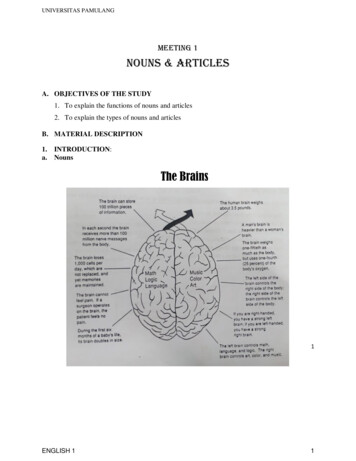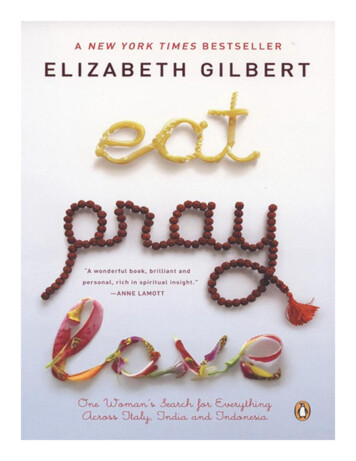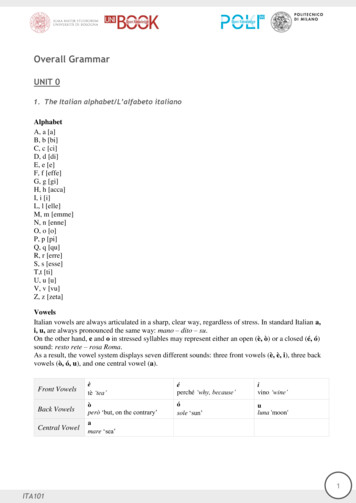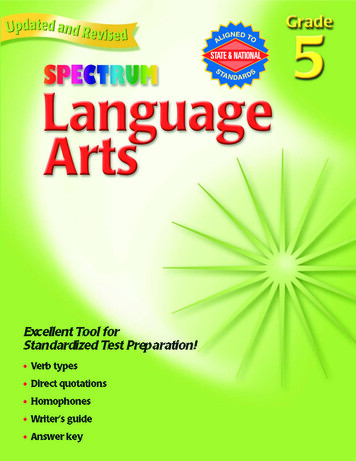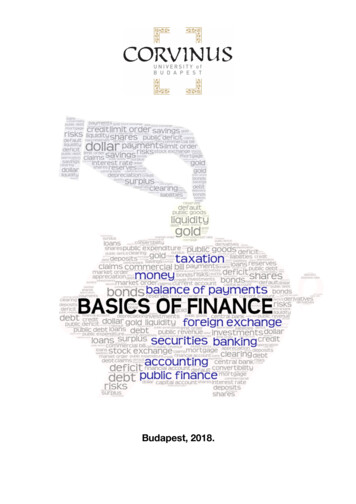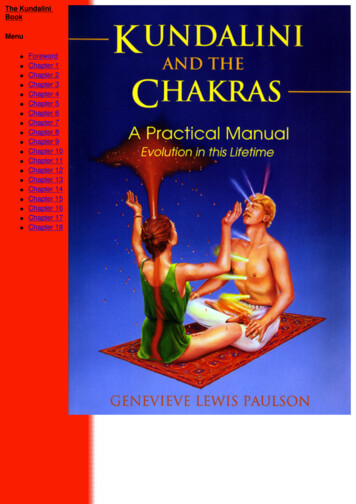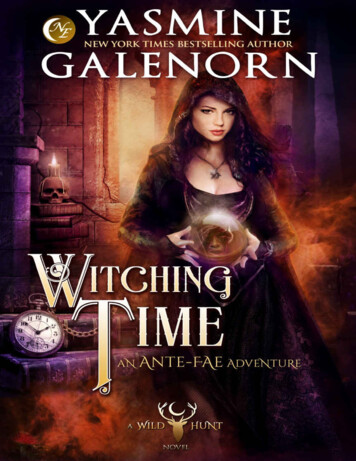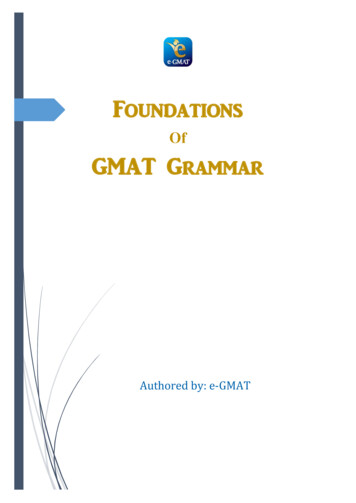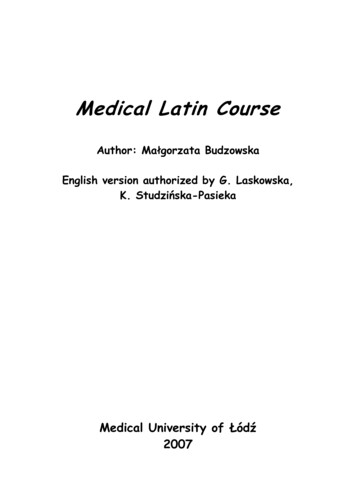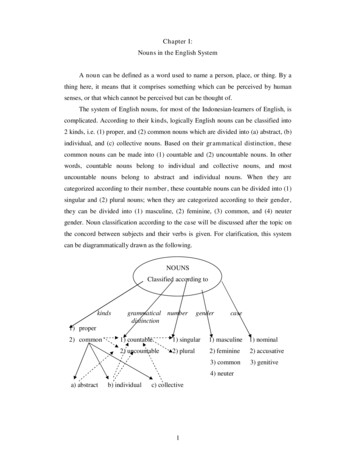
Transcription
Chapter I:Nouns in the English SystemA noun can be defined as a word used to name a person, place, or thing. By athing here, it means that it comprises something which can be perceived by humansenses, or that which cannot be perceived but can be thought of.The system of English nouns, for most of the Indonesian-learners of English, iscomplicated. According to their kinds, logically English nouns can be classified into2 kinds, i.e. (1) proper, and (2) common nouns which are divided into (a) abstract, (b)individual, and (c) collective nouns. Based on their grammatical distinction, thesecommon nouns can be made into (1) countable and (2) uncountable nouns. In otherwords, countable nouns belong to individual and collective nouns, and mostuncountable nouns belong to abstract and individual nouns. When they arecategorized according to their number, these countable nouns can be divided into (1)singular and (2) plural nouns; when they are categorized according to their gender,they can be divided into (1) masculine, (2) feminine, (3) common, and (4) neutergender. Noun classification according to the case will be discussed after the topic onthe concord between subjects and their verbs is given. For clarification, this systemcan be diagrammatically drawn as the following.NOUNSClassified according tokindsgrammatical numberdistinctiongendercase1) proper2) common1) countable1) singular1) masculine1) nominal2) uncountable2) plural2) feminine2) accusative3) common3) genitive4) neutera) abstractb) individualc) collective1
A. KindsAccording to their kinds, nouns can be classified into proper and commonnouns.1. A proper noun is, referring to Maurer (2000:105), a name of a particular,individual person, place, or thing who/which is usually unique. It is written is a capitalletter.2. A common noun is, according to Wren and Martin (1990:5), “a name given incommon to every person or thing of the same class or kind”. Different from propernouns, this sort of nouns is not written in a capital letter. The following chart showshow these two categories work in practice.proper nounscommon trySarjana WiyatauniversityWhen classified into their particular details, common nouns can be dividedinto 3 classes, i.e. abstract, individual, and collective nouns.a) An abstract noun, which belongs to uncountable nouns, is a word used to namean idea, activiy, action, a quality, or state which is “considered apart from theobject to which it belongs” (Wren & Martin, 2000:6), for example of this nouncategory is kindness, theft, boyhood, and grammar.b) An individual noun, which belongs to countable nouns, is a word that represents atypical member of a group and may include most f the concrete nouns, i.e. wordswhich can be perceived by human senses. This caegory can be exemplified bythese words: student, lawyer, flower, and plant.c) A collective noun names a group, number, or collection of persons, objects, orthings “taken together and spoken f as one whole” (Whren & Martin, 2000:5), forexample, fleet, police, and crowd. Noticed how they are used in the followings.1) A fleet may mean a number of warships or vessels, under one commander. Forexample, Admiral Sudomo led the Indonesian combat fleet to attack the Dutchfleet.2
2) Police is “men and women belonging to a departememnt of govermentconcerned with the keeping f public order: Several hundred police were onduty at the demonstration” (Hornby, 1974:644).3) A crowd means “a large number of people together, but without order ororganization : He pushes his way through the crowd” (Hornby, 1974:206).EXERCISESI.Decide which of the following nouns belong to proper nouns, and then decide alsowhether those which do not belong to this class are abstract, individual, orcollective.Jones, money, rocket, actress, King James I, hatred, mob, conscience, StateUniversity of Yogyakarta, herd, team, the Himalayas, patriotism, town, pencilII. Identify the proper nouns in the following list and write them with a capital letteron a separate sheet of paper.william shakespearemerdeka squarecity trafficsecretaryaprilsnownew south walesthamesblue mountainprisonersaint valentineapollo 11romeo and julietseaweedjefferson high schoolIII. Form the abstract nouns from the riotservewideIV. Supply the appropriate collective nouns for a number of the following nouns.1. a of bananas8.a of lions2. a of books9.a of people in church3. a of brigands10. a of sailors on a ship4. a of disorderly people11. a of ships3
5. a of elephants12. a of stars6. a of fish13. a of trees7. a of hounds14. a of wolvesV. Write your own sentences using the following expressions.1. the Broadway Stage6. a fleet2. the police7. further information3. the jury8. severe life4. a herd9. thirty feet in length5. white collar crime10. mass-killing weaponB. Grammatical Distinction and NumberWhen the classification is made on the basis of their grammatical distinction,as stated above, common nouns may be grouped into 2. They are (1) countable nounswhich are made up from individual and collective nouns and (2) uncountable nounswhich are mostly made up from abstract nouns. According to their number, thesecountable nouns can be made into (1) singular and (2) plural nouns. Although the noteon countable and uncountable nouns in this section is trustworthy, it is not alwayseasy to distinguish countable from uncountable nouns. Swan (1983:164) states thatIt is not always obvious whether a word is countable and uncountable; if youare not sure, check in the Oxford Advanced Learner’s Dictionary of CurrentEnglish (nouns are marked C or U). Sometimes words can be uncountablewith one meaning and countable with another, .1. A countable noun refers to nouns denoting persons or things that can be counted.Therefore, it is only the nouns in this category which can be made into the pluralform. In their singular form, they are preceded by the indefinite article ‘a/an’.The plural form of the singular countable nouns are normally made by adding–s, as a book à books, a pen à pens, and a cow à cows. However, nouns ending in–s, –sh, –ch, or –x, and –o, form their plural by adding –es to their singular form, likea kiss à kisses, a match à matches, a tax à taxes, and a mango à mangoes, exceptthe followings:4
a dynamo à dynamosa soloà solosa cantoà cantosa memento à mementosa pianoà pianosa photoa quarto à quartosà photosBut all nouns ending in -o preceded by a vowel take only the –s form, e.g.a cuckoo à cuckoosa curio à curiosa bamboo à bamboosa radio à radiosa portfolio à portfoliosa ratio à ratiosa stereo à stereosNouns ending in –y, preceded by a consonant, form their plural by changing –yinto –ies, as an army à armies, or a story à stories, but when the –y ending ispreceded by a vowel, the plural form simply takes –s, e.g. a valley à valleys, adonkey à donkeys, a boy à boys, or a key à keys.Many nouns ending in –f or –fe form their plural by changing –f or –fe into –ves,as a thief à thieves, or a calf à calves, except:a chief à chiefsa dwarf à dwarfsa proof à proofsa roof à rootsa safe à safesa leaf à leavesa gulf à gulfsa serf à serfsa belief à beliefsa grief à griefsa brief à briefsBut there are words in the category above which have both plural forms.a scarf à scarfs or scarvesa staff à staffs or stavesa wharf à wharfs or wharvesa hoof à hoofs or hoovesA few nouns form their plural in an irregular away.a louse à licean ox à oxena woman à women a tooth à teetha mouse à micea childà childrena datum à dataa nucleus à nucleia manà mena goose à geesea foot à feetSome nouns have the similar singular and plural forms: swine, sheep, deer, fish(but also fishes) cod, trout, salmon, pair, dozen, score, gross, hundred, and thousand(when used after numerals). Some are used only in plural:5
a) Names of instruments having two parts forming a kind of pair: bellows, scissors,tongs, pincers, and spectacles.b) Names of certain articles of dress: trousers, drawers, and breeches.c) Certain names of games: billiards, draughts, cards, and dominoes.d) A compound noun normally forms its plural by adding –s to the principal word, asa commander-in-chiefà commanders-in-chiefa coat-of-mailà coats-of-maila son-in-lawà sons-in-lawa daughter-in-lawà daughters-in-lawà step-sonsa step-sona step-daughtera maid-servanta passer-bya looker-ona man-of-warà step-daughtersà maid-servantsà passers-byàlookers-onàmen-of-warBut in the following both elements are made plural.a man-servantà men-servantsa woman-servantà women-servantsa gentleman-farmerà gentlemen-farmersa man-student/doctora lord-justiceà men-students/doctorsà lords-justicesa Knight-Templarà Knights-TemplarsNotice that the plural forms of a spoonful, a handful, and a mouthful are spoonfuls,handfuls, and mouthfuls because each of these words is regarded as one word.e) There are nouns which have two forms for the plural, each with somewhatdifferent meaning, some of the aresingularclothPluralclothà kinds or pieces of clothclothes à garmentdiediesà stamps for coiningdiceà small cubes used in games6
fishfishesà taken separatelyfishà collectivelygeniuses à persons of great talentgeniusgeniià spiritf) Conversely, there are nouns which have two meaning in the singular but only onemeaning in the plural. Some of them aresingularlightpluralà radiancelightsà lampsa lamppeoples à nationspeople à nationmen and womenpowders à doses of medicinepowder à a dose of medicine in finegrains like dustpractice s à habitspractice à habitexercise of a professiong) Some nouns have a different meaning in the singular and plural forms.singular formplural formadvicecounselinformationairatmosphereaffected mannersgoodbenefit, well-beingmerchandisecompassextent, rangean instrument for drawing al scienceirona kind of metalfettersforcestrengthtroops2. An uncountable noun or a non-count or mass noun, as Maurer (2000:106)asserts, names “things that cannot be counted in their normal sense because they existin a ‘mass’ form” whereas Eckersley and Eckersley (1973:20) affirm that this nounstands “for substances that cannot be counted” but “can only be measured”.Therefore, they cannot be made into the plural form, and in their normal meaning,they cannot be preceded by the indefinite article ‘a/an’. The nouns of the likenormally take a singular verb. The following nouns are usually uncountable:7
accommodation, behaviour, bread, chaos, furniture, luggage, scenery, traffic, travel,and weather. An uncountable noun is frequently made into countable by adding suchphrases as a piece of, a cup of, a grain of, a game of, a bolt of, a flash of, a clap of, orfive kilos of.It should be noted that there are uncountable nouns which take the plural form butwith a singular meaning, and therefore they always take a singular verb. These wordsare only a few examples: news, mathematics, economics, physics, linguistics, measles,and mumps.Maurer (2000:107) and Murphy (1987:138) advise that there are words which canbe used in either a countable or uncountable sense. Compare the followings.a) I bought a paper. (a newspaper)Each student is asked to submit a paper on grammar. (an essay, esp. one toread to a learned society)I need a sheet of paper. (material for writing on)b) There is a hair in the soup. (one single hair)She has beautiful hair. (hair on the head)c) We had many interesting experiences during our holiday. (things thathappened to us)You need experience for this job. (knowledge of something because you havedone it before)d) I ate meat for dinner.Different meats are available at the supermarket. (types f meat)e) We need to take water along on the camping trip.There are carbonated and uncarbonated mineral waters. (brands f mineralwater)f) TV is both good and bad.Yesterday we bought a TV. (informal for a television set)g) I drink coffee every morning.Please bring us three coffees. (informal for three cups of coffee)h) France produces wine.Cabernet Sauvignon is a wine produced in France. (a brand of wine)i) It takes work to prepare an elegant meal. (use of bodily or mental powers withthe purpose of doing or making something)Your meal is a work of art. (a product of the intellect or the imagination)8
EXERCISESI. Give the plural forms of the following nouns.negro, wish, studio, daily, convoy, reef, wharf, dormouse, echo, inch,mongoose, dwarf, calf, bough, fox, yoke, onlooker, looker-on, tigerlily, woman-teacher, moth-ball, major-general, madam, manhole,man-at-armII. In these two texts, decide uncountable and countable nouns. Circle theformer and underline the latter. Do not include proper nouns (any wordscapitalized). Count usages of words only once.1.When we talk about management, we may ask many different but relatedquestions. What is management? Is management necessary?What is amanager? What does a manager do? These are some of many questions we canask. We may not realize that management is not something we are notunfamiliar with because we deal with it all the time. We manage ourselves; wemanage our time, energy and talents. Managers make decision and so do we.The decisions we make in our every day lives on these three areas will have afar-reaching influence on our careers, our lives, and also the lives of others.When we talk about managers, however, we mean persons in position ofauthority to make decisions to use their resources and the resources of otherstowards the achievement of goals. Managers work in environment in whichthey conduct activities and perform certain roles which separate them fromnon-managers. The environments are organizations or companies which varyin size, structure, resources, personnel, and purpose. Although they vary, theyhave some things in common.Adapted form Introduction to Management by Plunkett & Attner pp.4-5.2.Dracula lay asleep on a bed of earth. His face was no longer pale but deepred, and his hair, instead of its usual black, was now iron-grey. Blood ran fromthe corners of his mouth, down his neck and on to his clothes. His whole bodywas swollen with blood. He smelt of blood, and on his face was the look of awild animal that had killed and fed until it could feed no more.9
Jonathan had to force himself to touch this bag of blood that was Dracula’sbody. But he could not leave now without going through Dracula’s .pockets tolook for the key. He searched, but they were empty. Dracula was too clever tobe caught like this.Adapted from Dracula by Bram Stoker, pp. 19—20III. Complete the sentences with the given nouns. Add final –s/–es if necessary.Use each noun only one rscrewdrivertraffic1. I have some coins in my pocket. In other words, I have some in mypocket.2. The Mississippi, the Amazon, and the Nile are well-known in the world.3. I like to listen to operas, symphonies, and folk songs. I enjoy .4. Since I came to the United States, I have visited Chicago, New York, andMiami. I want to visit other before I return to my country.5. The street is full of cars, trucks, and buses. This street always has heavy ,especially during rush hour.6. I put some banana peels, rotten food, and broken bottles in the waste can. Thecan is full of .7. They have a rusty car without an engine, broken chairs, and an old refrigeratorin their front yard. Their yard is full of .8. Tools that are used to fasten screws into woods are called .9. I went to the store to get some nails, hammers, and screws. In other words, Ibought some .10. Ann took three suitcases, a shoulder bag, and a cosmetics case. In other words,she took a lot of on her trip.IV. Each of the following sentences contains an error. Find and correct the error.1. Mary has fresh egg available because she raises chickens in her yard.2. Mrs. Smith always puts a lot of fruits and vegetables on the table.3. Anwar has been in the US three time. Thus, he’s spent a lot of time there.4. The extent of Jane’s knowledges on various complex subjects astounds me.5. Oranges, tomatoes, fresh strawberries, and green lettuces are rich in vitamin C.10
6. Besides providing a lot of facts, an encyclopaedia also provides us with a lotof informations.7. It is a must for you all to learn a lot of new words and study a lot of grammars.8. English vocabulary not only includes slangs but also idioms.9. It may be said that Shakespeare did not write novel; however, he is famous forhis poetry.10. The teacher gives a lot of assignments. In other words, I have a lot ofhomeworks to do tonight.V. Write about both of the following topics.1. Look around room/house/classroom/campus. Tell your reader what you see.Indicate quantity (some, a lot of, two, etc) and position (in the corner, next tothe bed, etc).2. Think of someone you admire. Tell your reader why you admire this person.C. GenderAlthough Eckersley and Eckersley (1973:41) state that “the concept of genderhas no grammatical function in modern English”, it is this phenomenon that theappreciation of the grouping of English nouns into their gender categories willbroaden one’s horizon. Wren and Martin (1990:7—8) introduce four technical termsto classify these nouns, namely, masculine, feminine, common, and neuter gender.These categories will form the basis to classify whether a certain noun may bereplaced by the pronouns ‘he’, ‘she’, or ‘it’. In practical English, animals are normallyreferred to by ‘it’ but when their sex is privileged, they may be spoken of as ‘he’ or‘she’.As it happens, these four classifications are entirely based upon a matter of sexor the absence of sex. All nouns that designate males are classified as masculinegender, those designating females are classified as feminine gender, thosedesignating either males or females are classified as common gender, and thosedesignating neither males nor females are classified as neuter gender. The exampleof these categories is seen in the following table.masculinefeminineboygirlsondaughtercommon} child/person11neuterbookkingdom
ressprincipal/head teachertrain, etcIt should be noted that collective nouns, even when they denote living beings,and young children like infants or babies and the lower animals like worms arereferred to as the neuter gender. The masculine gender is often employed for suchobjects which are “remarkable for strength and violence” as the sun, summer, winter,time, and death whereas the feminine gender is often applied to those “remarkablefor beauty, gentleness, and gracefulness” as the moon, the earth, spring, autumn,nature, liberty, justice, mercy, peace, hope, and, charity (Wren & Martin, 1990:8).They further assert that there are certain nouns which are personified. A ‘ship’ and a‘country’ are spoken of as ‘she’.There are four ways by which the masculine gender is distinguished from thefeminine one.1. By using entirely different hstallionmare2. By simply adding –ess from the masculine to form the feminine (as in the firsttwo columns of the table below), and sometimes with some slight changes (as inthe last two columns of the table horessabbotabbesbaronbaronessactoractress12
scountviscountessseamsterseamstress3. When words of common gender are made use of to distinguish the masculine fromthe feminine, it simply forms these words into compound words by adding wordswhich denote the sex.masculinefemininemasculinefeminineboy cousingirl cousingreat unclegreat auntbull-calfcow-calfhe-bearshe-bearcock sparrowhen sstomcattabby catman friendwoman friend4. English may also have adapted a number of foreign endings as ‘—ine’, ‘—trix’,or ‘—a’ to show the sex gnoraczar (tsar)czarina tatrixEXERCISESI. Decide the feminine forms of the following words. Please consult yourdictionary when you have a problem with your decision. (Hornby’s OxfordAdvanced Learner’s Dictionary of Current English is erlandlordnephewsirfoxhe-wolflordpeacocktutor13
gentlemanhostII. Decide to which gender group the following nouns belong. Please consultyour dictionary when you have a problem with your decision.chorus, doctor, doe, draper, ewe, heifer, hind, horse, nun, parent, pig, professor,puppy, representative, ship, sovereign, sow, spouse, sultan, table, tomboy,III. Give three nouns with masculine and feminine forms that you can use about:religion, nobility, restaurants, farm animals, and law.IV. A wedding usually brings together members of several families; it alsocauses certain changes in relationships. About twenty words can be used todescribe those concerned. How many can you find?14
1Chapter III:PronounsA pronoun (from Latin pro, meaning for, and nomen, meaning name) is a word usedinstead of a noun or a noun-equivalent. The meaning of a pronoun is restricted to relation orreference. It may name a person by his relation to the act of speaking such as I, you, he, she or athing by its relation of nearness or remoteness from the speaker like this, that. They are regardedas a major subclass of nouns because they can sometimes replace a noun in a sentence:NounPronounJohn got a new job.He got a new job.Children should watch less television.They should watch less television.Pronouns can be classified into Central (personal, reflexive, possessive), Relative,Interrogative, Definite, and Indefinite Pronouns. This chapter centers only on central, definite,and indefinite pronouns.A. Central /F/N/CTheythemtheirtheirsthemselvesperson2ndperson
21. Personal PronounPersonal pronouns are the pronouns which refer to the nouns which they replace. In thiscase, they refer to people and the pronoun it, although this pronoun does not usually refer to aperson.NounArnold gave the ring to Sophia.PronounHe gave it to her.The subject pronoun he refers to Arnold whereas it refers to the ring. It is used as anobject pronoun of the verb gave, while her is the object pronoun of the preposition to.2. Possessive PronounsEither possessive adjectives or possessive pronouns show possession. However, they donot have the same function. Possessive adjectives are accompanied by a noun. Possessivepronouns are not accompanied by a noun, but standing by themselves.NounThe students submitted their homework.PronounThe students submitted theirs.In the example above, the first sentence, the possessive adjective their is accompanied bythe noun homework. Meanwhile, in the second sentence, possessive pronoun theirs is notaccompanied by a noun. It stands by itself.3. Reflexive PronounsThe reflexive pronouns end in –self/selves. They are used when the subject (e.g., they)and the object (e.g., themselves) are the same. The action of the verb is pointed back to thesubject of the sentence. They found the answers by themselves. She always prepares the meal by herself. We must study the materials by ourselves before we attend the class. Arnold usually finishes his job by himself if it is possible.
3The reflexive pronouns have a function of their own in the sentence. Their antecedent is anoun or pronoun (usually the subject of the sentence, although not always) which precedes themin the sentence. Their functions are as follows:1. as object of a verb. He praises himself. Put yourself in my place.2. as object of preposition. Do the exam by yourselves. She cooks for herself.3. as indirect object (adverbial objective). I made myself a new dress. The students do themselves assignments.4. as predicate nominative (subjective complement) No woman could be herself under those conditions. Andrew was not himself yesterday.The reflexive pronouns are also used to emphasize a certain person/thing, either a subjector an object of a sentence. It means that the speaker or the writer emphasizes the person/thingonly, not other persons/things. Study the following examples.John himself prepares the meal.I myself wrote this book when I was a student.The students themselves organize the seminar.Diana washed the hat itself.The students study the books themselves.Mother bought a watermelon itself yesterday.It is only John who prepares the meal, no otherpersons.It is I who write the book, no others’ help.It is the students who organize the seminar, notlecturers/other persons.It is only the hat which Diana washed, notother things.The books are the only references which thestudents study, not other references likemagazines, newspapers, or journals.It is only watermelon which mother bought.B. Definite PronounsDefinite pronouns, also called demonstrative pronouns, consist of this, that, these, andthose. This and these refer to what is near in space, time, or conception. That and those, on theother hand, refer to what is farther off. These definite/demonstrative pronouns are use
4anaphorically, i.e., to refer to something mentioned before. The plural form of this is these andthat, hatthose She talked much about America and I did not know about this. The teacher talks much about pre-historic cultures. Those are quite unfamiliar with me. Anold : “The dean said that you should wear your uniform.” Bob: “I don’t care about that.”C. Reciprocal PronounsThe reciprocal pronouns are each other and one another. They indicate that the individualmember of a plural subject mutually react one on the other. Each other should be use for twopersons or two groups of persons. One another should be used for more than two persons orgroups. The husband and the wife understand each other. That the students talk with one another makes the lecturer angry.D. Indefinite PronounIndefinite pronouns refer to an unknown or undetermined person, place, or thing. Caremust be taken to identify whether the pronoun is singular or plural to ensure the properconjugation of the verb.1. Indefinite pronouns that are always singular:Some indefinite pronouns always take a singular verb, which means that the verb isconjugated for a singular subject. For example: Neither of the doctors plans to solve Aaron's injury with surgery.
5In this sentence, NEITHER is the subject. Because NEITHER is singular, it takes a single verb.In other words, the verb is conjugated as if the subject is a single person: NEITHER PLANS.Just as we would write THE DOCTOR PLANS.Another, Anyone, Anybody, Anything, Everyone, Everybody,Always singularEverything, Nothing, Each, Either No One, Neither, Nobody, One,Someone, Somebody, Something Every season another of the players attempts to break McGuire's record. Whatever anyone says about Clinton's veracity about his private life, when it came to theeconomy he absolutely kept his word Someone on Gore's staff mumbles that Tipper isn't feeling well and that the VicePresident has to take her home. Another is that Bill Clinton seems particularly unsuited to passively letting his last yearslip by uneventfully.2. Indefinite pronouns that are always plural:Some indefinite pronouns always take a plural verb, which means that the verb is conjugated fora plural subject. For example: Both of the divers claim responsibility for finding the treasure first.In this sentence, BOTH is the subject. Because BOTH is plural it takes a plural verb. In otherwords, the verb is conjugated as if the subject is more than one person: BOTH CLAIM. Just aswe would write THE DIVERS CLAIM.Always pluralBoth, (a)Few, Many, Several Both have paid tacit homage to this new reality. Many concede that the party had to change. A few make the same point but much more forcefully. Several of the bills that he signed contain provisions he abhorred but promised to fix.3. Indefinite pronouns that may be singular or plural:Some of them may take a plural or singular verb depending on the meaning. For example: Some of the money remains unclaimed.
6In this sentence, SOME is the subject and the object of the preposition MONEY indicateswhether the verb should be singular or plural. Because MONEY in this sentence is a single unit,the verb is singular. SOME REMAINS. Some of the children hide from the teacher.In this sentence, SOME is the subject and the object of the preposition CHILDREN indicateswhether the verb should be singular or plural. Because CHILDREN in this sentence is plural, theverb is plural. SOME HIDE.Either plural or singularAll, Most, None, Some All of the traditional groups we count on to re-elect us are against NAFTA. Almost all of the money in the budget is being diverted from those programs. None of the ways of looking at a President's legacy is simple. It would seem as if none of the relief supplies were actually delivered. Some of the pundits say that Bush is in danger of being made into Dan Quayle. Experts believe some of the negative campaigning appears to have run its course.EXERCISESI. Choose the
-s, as a book à books, a pen à pens, and a cow à cows. However, nouns ending in -s, -sh, -ch, or -x, and -o, form their plural by adding -es to their singular form, like a kiss à kisses, a match à matches, a tax à taxes, and a mango à mangoes, except the followings: 1. the Broadway Stage 2. the police 3. the jury 4. a herd 5.
